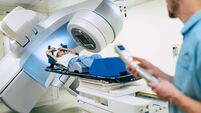Tackling cancer: 'I’ve had a lot of surgeries — Dad and I were a tag team'

CLOSE CONNECTION: Katherine Dolphin Griffin was diagnosed with thyroid cancer while caring for her father who had throat cancer. Pictures: David Keane
Katherine Dolphin Griffin was six months pregnant with her son when her beloved dad was diagnosed with non-Hodgkin's lymphoma in February 2008. “My life fell apart. I felt my bump drop,” says the now 46-year-old mum of two.
Katherine was always a daddy’s girl and had a particularly strong connection with dad Joe from the age of 16 when her mother left home. “She left unexpectedly from my point of view,” she recalls, describing how she then took on the role of woman of the house. “I had four brothers — one older, he was 18. The youngest was 11. Our house was like a community centre. There could be 10 boys around the table and I’d be feeding them. They called me ‘the sister’.”











